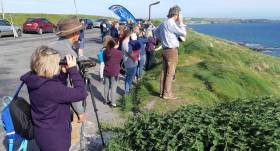Displaying items by tag: Whale Watch Day
IWDG Hails Return of Whale Watch Day With More than 500 People Joining In Around the Coast
Despite lower attendance and a reduced sighting rate, the Irish Whale and Dolphin Group (IWDG) says it is “delighted” with the return of its All-Ireland Whale Watch Day last month.
Held on Saturday 20 August during Heritage Week and for the first time since 2019, on account of the COVID pandemic, this year’s event saw an overall decline in attendance (-38% on 2019) and fewer cetacean sightings (33% of sites compared to 58% in 2019).
IWDG sightings officer Pádraig Whooley, who organised the event, suggested that a confluence of factors — from windy conditions on the day to the legacy of the pandemic and even holidays abroad — may have affected the turnout.
In addition, the poor sea state at many watch sites would have affected the sighting rate, with the best results at Clogherhead in Co Louth (two dolphin species and four harbour porpoises) and Howth Head in north Co Dublin (10 harbour porpoises). No whales were recorded at any of the 18 sites.
But some 530 marine wildlife enthusiasts made a day of it around the Irish coast, and Whooley is optimistic about the future of the initiative.
“We hope that among those who attended, there will be some new members and dedicated whale watchers who are willing to volunteer some of their time and energy in furthering our understanding of the whales and dolphins that live in Irish coastal waters,” Whooley said.
“Our challenge, post-pandemic, is to find new and innovative ways to rebuild this important natural history event and so we may explore the potential for moving it to May in 2023 to coincide with Biodiversity Week.”
Whale Watch Ireland 2019: Next Saturday 24th August
Minke and humpback whales arriving and other species of whales and dolphins along the Irish coast is a good omen for this years All Island Whale Watch day.
Organiser of the event, the Irish Whale and Dolphin Group (IWDG) invite you to join them for a land-based whale watch at a local headland between 2:00-5:00 pm on next Saturday, 24th August.
The purpose of whale watch day is to raise awareness of the 25 species of cetaceans (porpoises, dolphins and whales) recorded to date in all Irish waters, by giving the public an opportunity to look for and observe some of these wonderful marine mammals in their natural environment. This event also provides IWDG researchers with a unique snapshot of whale and dolphin activity around the Irish coast.
This annual, all-island event, organized by the IWDG and sponsored by Inis the Energy of the Sea www.seathebeauty.net is free and open to all.
All watches are land-based and will be led by experienced IWDG researchers, enthusiasts and whale watchers, who will show you how to observe and identify some of the more commonly recorded cetacean species in Irish waters.
You should bring binoculars or a spotting scope and dress appropriately and dress appropriately for outdoor weather conditions. There are no boat trips involved, and there is of course no guarantee that you will see whales or dolphins at your chosen site; but at last year’s event whales or dolphins were recorded at 14 of 19 sites (73.6%). So if the weather issuitable on the day, you’ve quite a good chance of seeing some really interesting marine wildlife, and in the process you’ll be supporting whale and dolphin conservation in Ireland by becoming actively involved in Citizen Science.
Please click and scroll down page to contact your local organizer for further details as listed from the IWDG website www.iwdg.ie and for the latest information on whale and dolphin sightings and strandings in Irish waters.
Whale Watch Ireland, will once again be part of Heritage Week, co-ordinated by the Heritage Council www.heritagecouncil.ie



























































